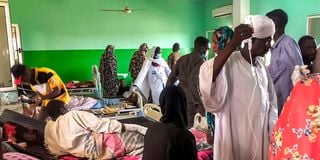Sudan conflict: MSF doctors 'completely exhausted', exposed to danger

A handout picture taken on April 19, 2023 and obtained from Doctors Without Borders (MSF) on April 21, 2023 shows a crowded ward at a hospital in El Fasher in Sudan's North Darfur region, where multiple people have been wounded in ongoing battles there.
What you need to know:
- Sudan´s health system has been on the verge of collapse for decades; the economic crisis and political crisis pushed it to breaking point.
Médecins Sans Frontières/Doctors Without Borders has treated more than 200 people, 34 of whom have died, since fighting began in Sudan on April 15.
MSF Eastern Africa, which is monitoring the situation from Nairobi, Kenya, noted in an update that as the fighting in Sudan escalates, so does the number of casualties.
Dr Mohammed Musoke, the NGO’s deputy operations manager for Sudan, South Sudan and Somali, told Nation.Africa by phone that the situation in El Fasher was worsening.
“The number of wounded people is increasing by the day. Unless there is a ceasefire the situation will get worse,” said Dr Musoke.
Another medic, Dr Ghazali Babiker, said MSF teams everywhere in the country, especially in Khartoum, Darfur, North Kordofan and Gedaref states, were facing serious challenges.
“Our premises in Nyala and South Darfur, including one of our warehouses, have been looted. In Khartoum, most teams are trapped by the ongoing heavy fighting and are unable to access warehouses to deliver vital medical supplies to hospitals,” said Dr Babiker.
“In Khartoum, even ambulances are being turned back. They are not permitted to pass in order to retrieve bodies from the streets – or to transport those who have been injured to hospital.”
The medic further said that in Khartoum and other cities where fighting is intense, reports of overstretched and closed hospitals - running out of supplies, water, electricity and fuel for generators - were common.
“The staff in those medical facilities are working non-stop since the violence erupted and are completely exhausted. Many have been on duty for many hours, providing lifesaving care in extremely difficult circumstances despite the impact of the situation on them and their own families,” said Dr Babiker.
He said their support staff were ready to provide supplies and medical personnel to key functional health facilities that need support but that it is too dangerous for anyone to move within Khartoum and other cities.
“We urge all parties to the conflict to guarantee safety for medical staff and patients so that they can access healthcare facilities without fearing for their lives,” he said.
The medic further pleaded with all parties to the conflict to ensure that all health facilities - hospitals, clinics, warehouses and ambulances - are protected.
He said the majority of the people they are treating are in need of surgeries yet “there are only 38 beds in this hospital”.
“There is not enough space for them and many are being treated on the floors in the wards and in the corridors. The hospital is rapidly running out of medical supplies to treat survivors,” he said.
“It is running out of blood for transfusions. Fuel supplies for the hospital generator are also running low. It’s important to mention that without those vital supplies, there will be further loss of lives.”
The airport has been closed since Saturday so no additional medical supplies can be received.
“Most international support to Sudan was frozen and the ensuing economic crisis has caused the cost of living to increase for the population, resulting in increased food insecurity,” said Dr Babiker.
Before the conflict began, Sudan’s hospitals were already struggling to function due to a lack of medical supplies and brain drain.
Sudan´s health system has been on the verge of collapse for decades; the economic crisis and political crisis pushed it to breaking point.
“This latest development is going to further exacerbate the level of humanitarian need in the country, which was already at its highest in a decade,” said Dr Babiker.





